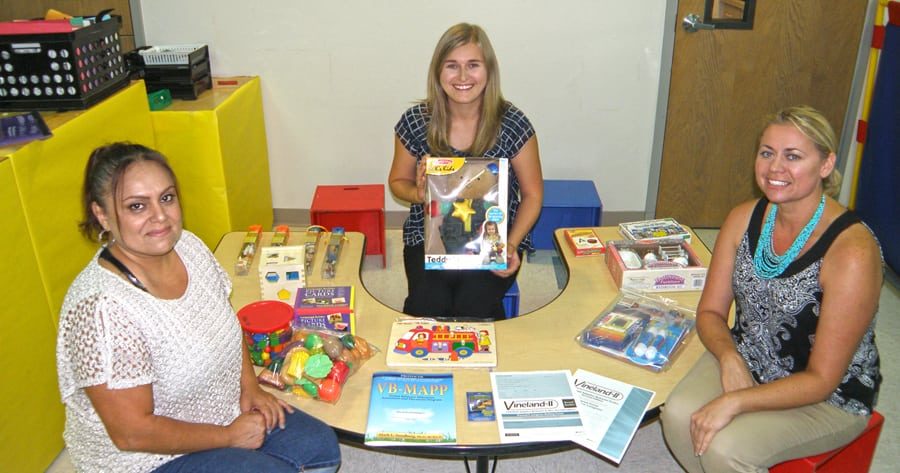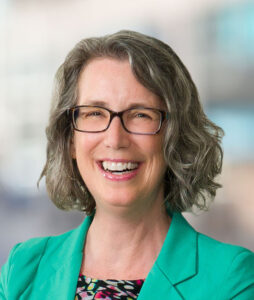
Home » Business donations help to launch new autism therapy program
Business donations help to launch new autism therapy program

September 14, 2017
Nearly $42,000 contributed to Children’s Developmental Center in Richland
The Children’s Developmental Center in Richland soon will begin offering an intensive research-based and data-driven therapy program to help children with autism.
The therapy, called applied behavior analysis, or ABA, helps children with autism learn through behavioral intervention by using everyday tools and routines from the child’s home and offering a chance to practice the skills with therapists.
[blockquote quote="ABA is a long-term therapy. You’re working a lifetime and lifestyle and working with parents." source="Haylee Carnes, behavior analyst at Children’s Developmental Center" align="right" max_width="300px"]
A large piece of the program includes parent training, as early intervention is most successful as soon as children are diagnosed so they can begin to modify their skills, said Haylee Carnes, behavior analyst overseeing the program at the Children’s Developmental Center.
“We get the parents involved a lot because they are children’s primary teachers,” she said.
The program targets kids ages 2 to 4 and “it’s very children- and parent-led,” Carnes said.
Several Tri-City businesses and groups helped offset start-up costs for program with donations totaling nearly $42,000. Donations came from Corwin Ford Tri-Cities, $15,000; Washington River Protection Solutions, or WRPS, $14,000; Grainger Foundation, $5,000; Agrium, $5,000; and Three Rivers Community Foundation, $2,695.
“We were glad we were able to kick-start this program and contribute initial seed money,” said WRPS spokesman Jerry Holloway, who said his company looks to assist programs that address the community’s unmet needs.
The program expects to be self-sustaining in the near future, Carnes said.
One in 68 children are diagnosed with autism or related disorders in the United States, said Cathryn Tames, executive director of the Children’s Developmental Center. It’s also more common in boys with one in 42 diagnosed, compared to girls, one in 89 diagnosed.
Children with autism can show a wide variety of behavioral symptoms, from failure to develop appropriate peer relationships to a delay in or a total lack of spoken language, according to the Center for Autism and Related Disorders.
Thanks to the donations to launch the program, Carnes and her team could buy an intervention and assessment system, which are used to evaluate the child and then set family goals, as well as toys to facilitate small-group learning. The money also was used to certify Children’s Developmental Center staff in ABA.
Class size will be small, with two to three kids per therapist.
Children in the program meet in a large room made up of multiple play-focused learning stations for social interaction, which they typically don’t get a lot of at home. There’s also one-on-one work and circle time.
The ABA program is viewed as a medical necessity to treat autism and insurance covers credentialed programs, Carnes said. Waiting lists for similar programs in the area are long.
Children who sign up for the program must have an autism diagnosis and a doctor’s referral to receive ABA therapy.
The community’s need for the therapy is great, Carnes said.
“ABA is a long-term therapy. It’s not a 12-week program. You’re working a lifetime and lifestyle and working with parents,” she said.
Kids will receive two hours of therapy a day, Monday through Thursday.
Fridays are reserved for home visits to work with the child’s family and set goals for the coming week. The visits also help to empower the parents to work with their children, Carnes said.
Six children have already signed up to receive the therapy and four are on a waiting list.
“We hope with time we’ll grow but there’s no space at the inn right now. We’ve outgrown our facility,” Tames said. “We do hope to expand in the future.”
But for the children and families the center can serve, it’ll make a difference, Carnes said.
“We’re not able to serve a huge mass of children. We’ll give them intensive therapy that will affect them for the rest of their lives. They’ll learn fundamental skills here,” she said.
The Children’s Developmental Center has been providing early intervention services to infants and toddlers with developmental delays since 1977.
The center, which serves about 200 kids a month, employs 28 people and operates on a $2.1 million annual budget,with revenue coming from area school districts, insurance companies, the counties, the state Department of Health, donations and fundraisers.
For more information about ABA, call 509-735-1062 ext. 262 or email hayleec@childrensdc.org.
Local News Education & Training
KEYWORDS september 2017




